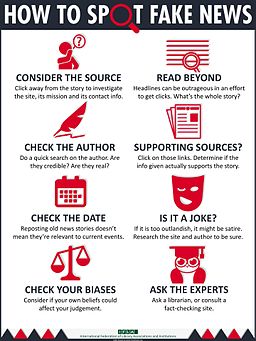Information Literacy – You will:
- revise your search strategies and employ appropriate research tools,
- integrate relevant information from reliable sources,
- question and evaluate the complexity of the information environment, and
- use information in an ethical manner.
Readings: What is Information Literacy and why is it important?
Articles and Resources for students: 
ALBANESE, ANDREW RICHARD. “Can You Believe It?” _Publishers Weekly_, vol. 265, no. 38, Sept. 2018, pp. 28–30. EBSCOhost, search.ebscohost.com/login.aspx?direct=true&db=aph&AN=131799545&site=ehost-live.
Applying the CRAAP Test. California State University, Chico, Meriam Library. (2010). www.csuchico.edu/lins/handouts/eval%5fwebsites.pdf
Boylan, Jennifer Finney. “Will Deep-Fake Technology Destroy Democracy?” _The New York Times_, The New York Times, 17 Oct. 2018, www.nytimes.com/2018/10/17/opinion/deep-fake-technology-democracy.html.
Fabbro, Elaine. “Information Literacy.” _Encyclopedia of Distance Learning_, Patricia Rogers, et al., IGI Global, 2nd edition, 2009. Credo Reference, https://marshall.idm.oclc.org/login?url=https://search.credoreference.com/content/topic/information_literacy?institutionId=3309. Accessed 14 Feb. 2019.
“How To Understand the Bias of a Publication.” _Points of View_: Writing an Essay, June 2014, p. 10. EBSCOhost, search.ebscohost.com/login.aspx?direct=true&db=pwh&AN=30067593&site=pov-live.
Kiely, Eugene, and Lori Robertson. “How to Spot Fake News.” FactCheck.org, A Project of The Annenberg Public Policy Center of the University of Pennsylvania, 19 Dec. 2016, www.factcheck.org/2016/11/how-to-spot-fake-news/.
Pattison, Darcy. “Fake News: Teaching Skeptics, Not Cynics.” Knowledge Quest, vol. 47, no. 1, Sept. 2018, pp. 62–64. EBSCOhost, search.ebscohost.com/login.aspx?direct=true&db=aph&AN=131625599&site=ehost-live.
Project Information Literacy https://www.projectinfolit.org/
“Takis Metaxas: Separating Truth from Lies” (email interview), by Alison Head and Kirsten Hostetler, Project Information Literacy, Smart Talk Interview, no. 27 (21 February 2017).
IFLA [CC BY 4.0 (https://creativecommons.org/licenses/by/4.0)], via Wikimedia Commons https://commons.wikimedia.org/wiki/File:How_to_Spot_Fake_News.jpg
“Breaking News | Radiolab.” Wnycstudios, WNYC, 27 July 2017, www.wnycstudios.org/story/breaking-news. Information Literacy in part is concerned with the use, misuse and misrepresentation of information. This Radiolab podcast episode examines audio and video deep fake technology and implications for the media industry, news reporting and consumption, political elections and democracy and more. Think about this – technology exists (and constantly is being refined and improved) that can depict YOU (or anyone else) saying things you’ve never said in places you’ve never been.
“Fear and Loathing in Homer and Rockville.” _This American Life_. https://www.thisamericanlife.org/621/fear-and-loathing-in-homer-and-rockville#2016 . This podcast is a tremendous resource for an examination of the power of confirmation bias.
Is Facebook Spying on You? Information literacy is about the use and misuse of information, so this podcast is great food for thought for a discussion about the implications of social media tracking technology. ReplyAll. Gimlet Media. https://www.gimletmedia.com/reply-all/109-facebook-spying. 2 November 2017.
Reality: What’s Real Anymore? https://www.nytimes.com/2019/01/31/podcasts/still-processing-reality-green-book-r-kelly.html?action=click&module=Briefings&pgtype=Homepage
Videos
Galef, Julia. “Why You Think You’re Right — Even If You’re Wrong.” Ted, Ted, Feb. 2016, www.ted.com/talks/julia_galef_why_you_think_you_re_right_even_if_you_re_wrong. A fantastic TED talk examining confirmation bias, which has information literacy implications in terms of seeking out information with which we agree and discounting information that doesn’t support our preconceived beliefs.
What is Information Literacy – a video via Lynda. Did you know that Marshall University has a subscription to Lynda tutorials? Visit this link to log in and watch and learn more: http://www.marshall.edu/lynda/
Information Cycle – another Lynda video. https://www.lynda.com/Higher-Education-tutorials/information-cycle/368046/420107-4.html
Other Library resources:
IF I APPLY – Excellent tool and tips to use when evaluating sources! Created by two librarians right here at Marshall University as well as a former librarian who now is at Penn State University.
Information Literacy Libguide – Marshall University Libraries
Information Literacy Resources for Faculty and Librarians – WVU Libraries
Framework for Information Literacy – ACRL
Information Literacy User’s Guide: An Open, Online Textbook- Written to help students examine their roles as information creators and sharers and enables them to more effectively develop related skills. The textbook includes case studies, hands-on exercises, and quizzes.
Information Literacy – Wesleyan University
Tutorials – Links to Information Literacy Tutorials coming soon!
Faculty Resources Provided by Marshall University Libraries – Information Literacy Research Instruction
How to Teach Information Literacy in the Era of Lies – The Chronicle of Higher Education
Information Literacy Resources for Faculty and Librarians – WVU Libraries
Other resources:
- Diigo Web Collector https://www.diigo.com/index
- Dipity Digital Timeline Website. http://www.dipity.com/
- Piktochart Infographic Design Website http://piktochart.com/


